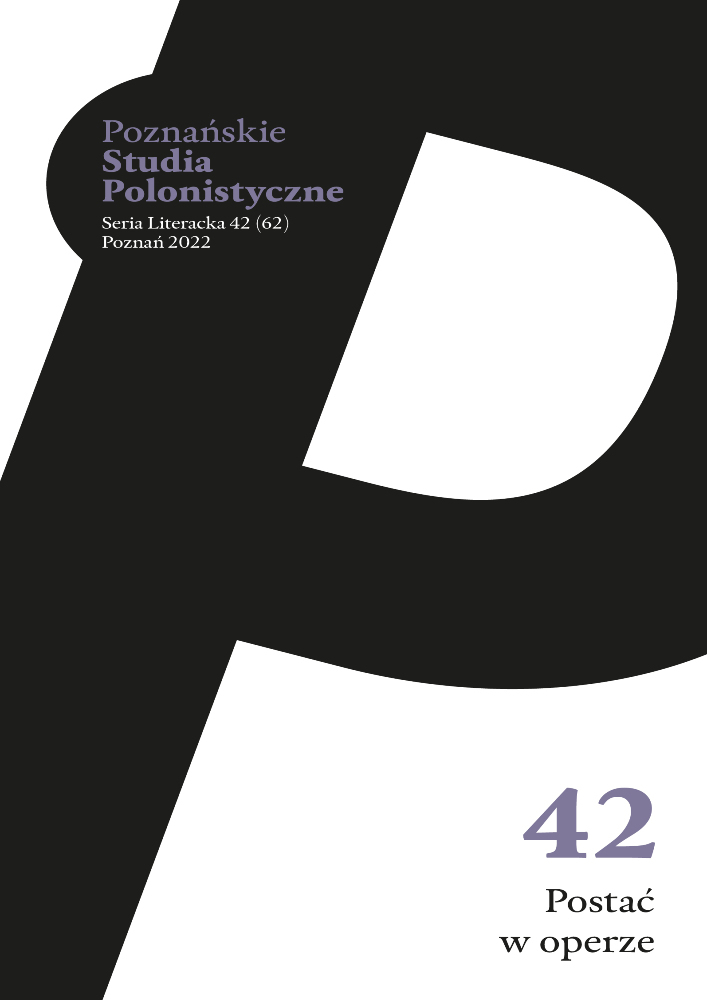Abstrakt
Ghosts have been an attractive element of operatic dramaturgy since the beginning of the genre’s history, and their stage presence influences the metaphysical and fantastic features of the works. In seventeenth- and eighteenth-century operas, conventional forms of musical presentation and characteristics of ghosts were developed, and in the nineteenth century a conventionalized method of musical presentation of ghosts in opera was shaped, which was also due to the great popularity of the theme of various spectres and phantoms in romantic culture. The proposed systematics concerns the ghosts presented in operatic works. Three criteria of division have been introduced: the existential status of ghosts, their number (singularity or multiplicity), and the types of afterlife the ghosts are associated with. The systematics is accompanied by the distinction of the means of musical characteristics used by opera composers in order to suggestively represent ghosts in their works.
Bibliografia
Berlioz Hector, de Nerval Gérard (2022), La Damnation de Faust, [libretto], [dostęp: 7 września 2022], https://tinyurl.com/yrhep6kv.
Bukofzer Manfred (1970), Muzyka w epoce baroku. Od Monteverdiego do Bacha, przeł. Elżbieta Dziębowska, PWN, Warszawa.
Floros Constantin (1977), Gustav Mahler, t. 2: Mahler und die Symphonik des 19. Jahrhunderts in neuer Deutung, Breitkopf & Härtel, Wiesbaden.
Golianek Ryszard Daniel (1990), „Faust” Goethego w twórczości muzycznej epoki romantyzmu, „Muzyka”, nr 4, s. 41–48.
Handel Georg, Haym Nicola (2022), Giulio Cesare, [libretto],[dostęp: 7 września 2022], https://tinyurl.com/mrxrtjt6.
Jacobshagen Arnold (2000), Das Oratorium auf der Bühne – Anton Grigor’evič Rubinštejns Konzeption der „Geistlichen Oper”, w: Musikkonzepte – Konzepte der Musikwissenschaft, t. 2, red. Kathrin Eberl, Wolfgang Ruf, Bärenreiter, Kassel, s. 511–518.
Jęcz Jadwiga (2018), Komandor w operze. Konteksty, „Kwartalnik Młodych Muzykologów”, nr 4 (39), s. 21–38, https://doi.org/10.4467/23537094KMMUJ.18.037.9738.
Lühning Helga (1994), Arie. Da-capo-Arie und Generalbaßsatz,w: Die Musik in Geschichte und Gegenwart. Sachteil, t. 1: A–Bog, red. Ludwig Finscher, Bärenreiter, Kassel, szp. 816–819.
McClelland Clive (2012), Ombra: Supernatural Music in the Eighteenth Century, Lexington Books, Lanham.
Mianowski Jarosław (2000), Semantyka tonacji w niemieckich dziełach operowych XVIII–XIX wieku, Wydawnictwo Adam Marszałek, Toruń.
Mozart Wolfgang Amadeus, da Ponte Lorenzo (2022), Don Giovanni, [libretto], [dostęp: 7 września 2022], https://tinyurl.com/2rd78s74.
Musketa Konstanze, red. (2008), Mythos und Allegorie bei Händel, „Händel-Jahrbuch”, [nr] 54, s. 9–292.
operaschmopra (2018), Audrey Luna, Ariel – The Tempest,[dostęp: 14 września 2021], https://tinyurl.com/mr2enxx7.
Petersen Nils Holger (2010), Mozart und das Jüngste Gericht: Der Komtur, die Posaune Gottes und… Søren Kierkegaard, w: Mozart und die Religion, red. Peter Tschuggnall, Müller-Speiser, Anif, s. 191–205.
Rallo-Ditche Elisabeth (2005), La voix des ombres dans „Le tour d‘écrou” de Britten, w: Éclats de voix. L’expression de la voix en littérature et en musique, red. Pascal Lécroart, Frédérique Toudoire-Surlapierre, Improviste, Paris, s. 279–287.
Rubinstein Anton (1882), Die geistliche Oper, w: Vor den Coulissen, red. Joseph Lewinsky, t. 2, Hofmann, Berlin, s. 47–50.
Schreiber Ulrich (1997), Verdis schillerndes Opernphantom, w: Verdi--Theater, red. Udo Bermbach, Metzler Verlag, Stuttgart, s. 89–103, https://doi.org/10.1007/978-3-476-03679-7_6.
Schwinger Wolfram (1987), Dämonen, Engel und Gespenster: Der Opernkomponist Krzysztof Penderecki, „Oper heute”, [nr] 10,s. 175–204.
Licencja
Autorzy
Autorzy tekstów przyjętych do publikacji w czasopiśmie „Poznańskie Studia Polonistyczne. Seria Literacka” są zobowiązani do wypełnienia, podpisania i odesłania na adres redakcji umowy o udzielenie nieodpłatnej licencji do utworów, z zobowiązaniem do udzielania sublicencji CC.
Zgodnie z umową, autorzy tekstów opublikowanych w czasopiśmie „Poznańskie Studia Polonistyczne. Seria Literacka” udzielają Uniwersytetowi im. Adama Mickiewicza w Poznaniu niewyłącznej i nieodpłatnej licencji oraz zezwalają na użycie sublicencji Creative Commons Attribution-NoDerivatives 4.0 International (CC BY-ND 4.0).
Autorzy zachowują prawa do dalszego, swobodnego rozporządzania utworem.
Użytkownicy
Zainteresowani użytkownicy internetu uprawnieni są do korzystania z utworów opublikowanych od 2016 roku w „Poznańskich Studiach Polonistycznych. Serii Literackiej” pod następującymi warunkami:
- uznanie autorstwa – obowiązek podania wraz z rozpowszechnionym utworem, informacji, o autorstwie, tytule, źródle (odnośniki do oryginalnego utworu, DOI) oraz samej licencji;
- bez tworzenia utworów zależnych – utwór musi być zachowany w oryginalnej postaci, nie można bez zgody twórcy rozpowszechniać np. tłumaczeń, opracowań.
Do wszystkich tekstów opublikowanych przed 2016 r. prawa autorskie są zastrzeżone.
Inne
Uniwersytet im. Adama Mickiewicza w Poznaniu zachowuje prawo do czasopisma jako całości (układ, forma graficzna, tytuł, projekt okładki, logo itp.).

